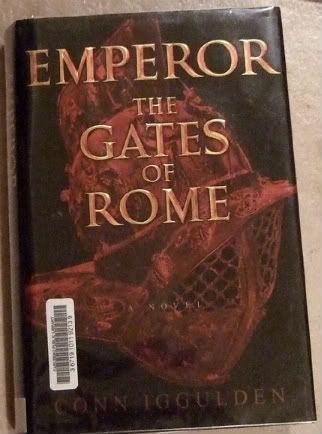



The goodness of the true pun is in the direct ratio of its intolerability.— C, MARGINALIA
Edgar Allan Poe at Bookreporter.com
Edgar Allan Poe at Wikipedia
Who is Conn Iggulden?
Don't I mean "what" is a Conn Iggulden? No, I don't, thank you very much. I do mean who. Mr. Iggulden, a British author who writes mainly historical fiction, was born in 1971, the year that I got married. Last night at work, a woman customer was looking for one of the books in Mr. Iggulden's Emperor series that is loosely based on the life of julius Caesar.
If you talk to people about their favorite authors, you get used to the enthusiasm that those people wrap the author up in if they really enjoy the author. I personally enjoy hearing enthusiasm for authors, books, reading, and other subjects close to my heart. I enjoyed finding out about Mr. Iggulden from this lady. Her husband didn't show any enthusiasm for reading, milding stately that in his career he had already done enough reading.
At Wikipedia, we find that  Iggulden's first book in the Emperor series came out in 2003--The Gates of Rome, the youth of Caesar (little Caesar?). Then, The Dream of Kings in 2004, The Field of Swords in 2005, and finally, The Gods of War in 2006.
Iggulden's first book in the Emperor series came out in 2003--The Gates of Rome, the youth of Caesar (little Caesar?). Then, The Dream of Kings in 2004, The Field of Swords in 2005, and finally, The Gods of War in 2006.
 Iggulden's first book in the Emperor series came out in 2003--The Gates of Rome, the youth of Caesar (little Caesar?). Then, The Dream of Kings in 2004, The Field of Swords in 2005, and finally, The Gods of War in 2006.
Iggulden's first book in the Emperor series came out in 2003--The Gates of Rome, the youth of Caesar (little Caesar?). Then, The Dream of Kings in 2004, The Field of Swords in 2005, and finally, The Gods of War in 2006.And guess what, my friends? Our library has all four books of the series. I checked one out today to see how it "read" and it reads very well. It starts off very exciting, indeed.
Two partial reviews of The Gates of Rome posted at Amazon.com--
From Publishers Weekly
If the Roman Empire had taken as long to rise and fall as this novel takes to discover a main character and a plot, most of the world would still be wearing togas today. The story, such as it is, revolves around two boys: Gaius, the broody son of a wealthy senator, and Marcus, a prostitute's mischievous child who is reared as Gaius's brother and trained with him in the arts of war. Before the two boys reach majority, they are thrust into adulthood by the untimely death of Gaius's father and take up residence in Rome with Gaius's uncle Marius, a powerful consul who is vying with Sulla for control of the Republic. When Marcus is 14, he joins the Fourth Macedonian Legion to earn his fortune; Gaius remains by his uncle's side. Iggulden lingers long over boyhood pranks, trying the reader's patience; the pace picks up only halfway through the novel. Frequent fight scenes, ranging from individual combat to full scale battles, liven the mix somewhat, but the cartoon-like ability of the characters to bounce back after a few stitches weakens the effect. Though Iggulden has a solid grounding in Roman military history, anachronisms in speech and attitude ("Cabera took him outside and gave him a hiding") roll underfoot and trip up authenticity. A major twist toward the end reveals the protagonists to be two of Roman history's best-known figures, but readers with some knowledge of the period will have guessed their identities already. This is ultimately little more than a protracted introduction to a bigger story, which Iggulden will surely go on to tell.
Copyright 2002 Reed Business Information, Inc.
From Library Journal
English writer Iggulden's first novel is the story of two young boys-Gaius and Marcus, raised as brothers though one is illegitimate-as they grow to adulthood in Rome two millennia ago. At that time, the republic was beginning to fall apart, a collapse that would result in the civil wars that brought the emperors to power. It was a time of turmoil, chaos, revolutions, casual violence, and savage brutality, and Iggulden's descriptions of the culture and environment are vivid. Although covering a period unknown to most lay readers, Emperor is a surprisingly fast and often exciting read. Iggulden admits to taking some liberties with history, and his masking the identities of Gaius and Marcus is unnecessary and distracting. While the real identity of Marcus (Et tu, Brute?) may be a puzzle, readers with a fair knowledge of Roman history will quickly identify Gaius (think of the Ides of March). Also, the roles of historical warlords Marius and Sulla are not well clarified. Still, this entertaining historical novel will appeal to fans of Steven Pressfield and Michael Curtis Ford. For larger collections. Robert Conroy, Warren, MI
Copyright 2002 Reed Business Information, Inc.
Reviews of The Gates of Rome at Amazon.com
The task of the modern educator is not to cut down jungles, but to irrigate deserts.
C.S. Lewis
C.S. Lewis at Quote Database
C.S. Lewis at Wikipedia
© Bob Hoff, 2008
No comments:
Post a Comment